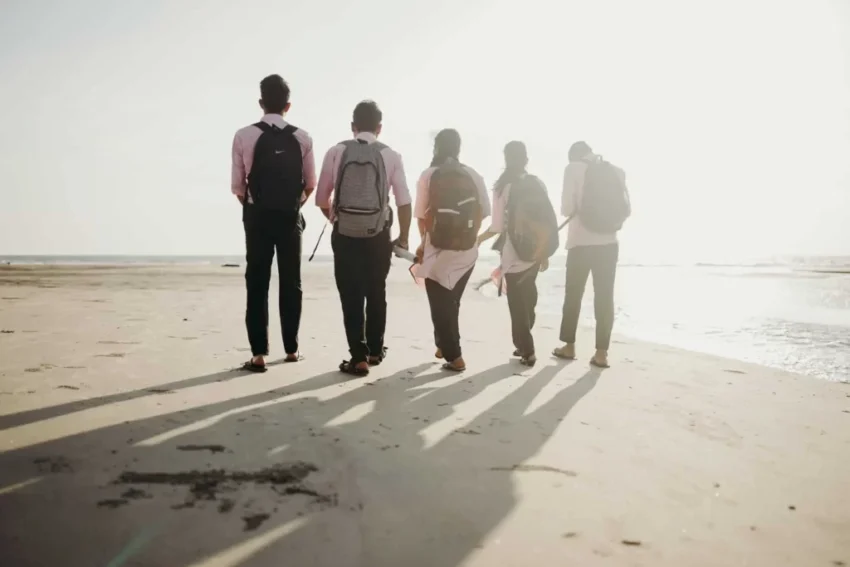Traveling is often seen as a way to relax, escape from the daily grind, or explore new places. However, it’s more than just a break from routine – it’s a powerful tool for personal growth and cognitive development. One of the most fascinating aspects of traveling is its ability to enhance creativity and improve problem-solving skills. Whether you’re exploring a new city, hiking through nature, or interacting with people from diverse cultures, travel can stimulate your brain in ways that push the boundaries of your imagination and cognitive abilities. In this article, we will delve into how traveling can nurture creativity, hone problem-solving skills, and provide a wealth of experiences that can transform your approach to challenges and innovation.
The Relationship Between Travel and Creativity
Creativity is the ability to think outside the box, come up with novel ideas, and see things from different perspectives. Traveling can amplify these cognitive functions in various ways. Here’s how:
1. Exposure to New Environments
One of the most obvious ways travel enhances creativity is by immersing you in new environments. Whether you’re visiting a bustling city or a serene countryside, new surroundings force your brain to adapt and observe. The unfamiliar sights, sounds, and smells require you to be more alert, stimulating your brain to think in different ways. When you’re constantly exposed to new experiences, you start to see the world in a more imaginative and diverse manner.
For example, a trip to a historic city like Rome can inspire an artist with its architecture and art. A visit to a remote village might ignite a writer’s imagination with its untold stories and different way of life. These experiences help break the monotony of everyday life and encourage your mind to stretch beyond its usual limits.
2. Cultural Exposure
When you travel to a foreign country, you inevitably encounter new languages, traditions, and ways of life. This exposure fosters creative thinking by introducing you to new ideas, beliefs, and philosophies. You might gain fresh perspectives on your own culture and find innovative ways of solving problems that you hadn’t considered before.
Engaging with people from different backgrounds opens up your mind to alternative viewpoints. For instance, someone from a collectivist culture may approach challenges with a community-focused mindset, whereas someone from an individualist society might prioritize personal responsibility. These varied approaches can inspire you to think in more diverse and creative ways when facing your own challenges.
3. Breaking Routine
Routine is often the enemy of creativity. When you travel, you step out of your daily habits, which can sometimes become restrictive. You no longer follow the same schedule, visit the same places, or interact with the same people. This break from the habitual can spark fresh ideas, allowing you to approach problems with renewed energy and an open mind.
By stepping into new situations and adapting to unfamiliar surroundings, your brain becomes more flexible and open to new possibilities. The unfamiliarity of a new environment requires you to use your imagination to find solutions and deal with new challenges, pushing your creative boundaries.
4. Immersing in Nature
Nature is a significant source of inspiration for many creative individuals. Whether it’s hiking in the mountains or walking along the beach, being in nature allows you to disconnect from the distractions of modern life and recharge your mind. Natural landscapes often evoke feelings of wonder and awe, which can trigger creativity. The tranquility of nature can help you clear your mind, allowing new ideas to surface and providing the mental space to think outside the box.
Spending time in nature also encourages mindfulness, a practice that’s been linked to increased creativity. The act of being fully present in the moment and appreciating the world around you can shift your perspective and enhance your ability to generate innovative ideas.
How Travel Enhances Problem-Solving Skills
Travel doesn’t just boost creativity – it also sharpens your problem-solving skills. Here’s how it can help:
1. Adapting to New Challenges
When you travel, you’re constantly faced with new challenges, from language barriers to navigating unfamiliar transport systems. These situations require quick thinking and flexibility. Whether you’re lost in a foreign city or trying to understand local customs, you’re forced to think on your feet and come up with solutions. This constant adaptation builds resilience and improves your problem-solving abilities.
For example, you might encounter a train delay in a foreign country and have to figure out alternative routes or modes of transport. Such situations require you to think critically, analyze your options, and make informed decisions – skills that can be transferred to problem-solving in professional and personal contexts.
2. Improved Decision-Making
Travel often forces you to make decisions in a timely manner, especially when faced with unexpected situations. When you’re in a foreign country, there are numerous decisions to be made on the fly, such as where to eat, where to stay, or how to get from one place to another. The need to make quick decisions can improve your judgment and sharpen your decision-making skills.
The more you travel, the more you’ll learn how to assess situations efficiently and choose the best course of action. Whether it’s choosing between two different routes on a hiking trail or selecting the best activity in a tourist destination, these decisions help you become more adept at making choices under pressure.
3. Resourcefulness
Travel often requires a high level of resourcefulness. Whether it’s figuring out how to communicate without knowing the local language or finding an emergency accommodation, travel encourages you to make the most of what you have. These experiences build problem-solving skills by encouraging you to think creatively and find solutions with limited resources.
For instance, if you find yourself without an internet connection in a foreign city, you might have to rely on physical maps or local recommendations to navigate. These types of resourceful thinking can transfer to your everyday life and make you more adept at solving problems in resource-constrained environments.
4. Learning from Mistakes
No travel experience is perfect, and mistakes are bound to happen – whether it’s missing a flight, losing a wallet, or misinterpreting a cultural norm. However, these setbacks are often the best opportunities for learning and growth. Dealing with mistakes in unfamiliar places helps you develop critical problem-solving skills, as you have to find ways to resolve issues without relying on familiar systems or support.
Mistakes while traveling also teach you how to stay calm under pressure, maintain a positive attitude, and embrace failures as learning experiences – all valuable attributes when tackling complex problems in any aspect of life.
7 FAQs About How Travel Improves Creativity and Problem-Solving Skills
- Can traveling really improve creativity? Yes, traveling exposes you to new environments, cultures, and challenges that encourage you to think in innovative ways. The more diverse the experiences, the more creative your mind becomes.
- How does traveling enhance problem-solving skills? Traveling forces you to adapt to new situations, make quick decisions, and navigate unfamiliar challenges, all of which sharpen your problem-solving skills.
- Is traveling to a different country necessary for improving creativity? While international travel can provide a wealth of new experiences, even traveling to nearby destinations can stimulate creativity by offering fresh perspectives and different environments.
- Can traveling help with career growth? Yes, the creativity and problem-solving skills gained from travel can be applied to your career, making you a more resourceful, innovative, and adaptable professional.
- What if I don’t travel often? Even occasional trips, whether domestic or international, can provide significant benefits for creativity and problem-solving. The key is stepping outside your usual routine and embracing new experiences.
- How can traveling boost decision-making abilities? Travel often requires quick decision-making in uncertain situations, helping you hone your judgment and the ability to evaluate options under pressure.
- Can solo travel improve creativity and problem-solving more than traveling with others? Solo travel can certainly encourage self-reliance and problem-solving, but traveling with others also offers unique opportunities for collaboration and learning from different perspectives. Both types of travel can be beneficial.
Conclusion
Travel is far more than just a means of relaxation or leisure; it is an enriching experience that nurtures creativity and enhances problem-solving abilities. Whether you’re seeking inspiration for your next creative project or looking to improve your skills in tackling everyday challenges, traveling provides the perfect opportunity to expand your cognitive horizons. By exposing yourself to new environments, cultures, and experiences, you can unlock a deeper level of creativity and resourcefulness that will not only help you in your personal growth but also in navigating the complexities of everyday life.
Key Takeaways:
- Traveling exposes you to new environments, cultures, and challenges, fostering creativity and inspiring new ideas.
- Travel helps improve problem-solving by forcing you to adapt to new situations, make quick decisions, and use limited resources.
- The experience gained from travel can positively impact both personal and professional aspects of life, enhancing your ability to think outside the box and approach challenges with innovative solutions.

